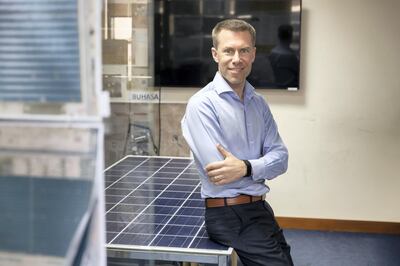Dubai energy company Enerwhere wants to expand into Oman, Saudi Arabia and Iraq as it evaluates the potential for solar energy to support upstream activities in the region.
Enerwhere specialises in portable, easy-to-install solar hybrid systems for projects off the grid, which in the UAE are largely construction schemes that typically do not plug into a main grid and derive power from polluting, fuel-inefficient diesel generators. The company has been targeting such projects by presenting a more sustainable alternative after studying a client's consumption patterns through artificial intelligence and big data.
"Oman, Saudi Arabia, and Iraq are the near-term countries right now – for the next two or three years," chief executive Daniel Zywietz told The National.
"Those are very large markets [and] are individually larger than the UAE market that we've been working on for seven years. Also, expansion is not just geographies, it's also the number of segments that we serve," he added.

Enerwhere is setting up floating solar panels off the resort island of Zaya Nurai in Abu Dhabi, helping hotel operators replace noisy diesel generators and access up to 8 per cent of their energy needs from the sun.
Mr Zywietz sees more potential for expansion in this field, which allows owners to free up beach space taken by generators and moor solar panels offshore instead.
Enerwhere, however, has its eyes set on a more lucrative proposition – helping oil and gas companies in the Middle East reduce their carbon footprint by using solar energy to carry out upstream operations.
"We started with the air conditioners for the camps or site office and today we power industrial facilities. We set up a few things. In the oil and gas sector we just set up drilling rigs and artificial lifts," said Mr Zywietz.
The company has been involved in drilling for oil at the Habshan field in Abu Dhabi and sees wider potential in taking over the power supply for the 500 drilling rigs operating in the region.
"That is $2m of diesel fuel consumption per year – that is a billion-dollar market just for the drilling rigs," said Mr Zywietz.
While construction sites may have been an easier move-in for the clean energy company, servicing oil industry processes may be a more challenging proposition.
However, Mr Zywietz is optimistic. International and national oil companies are changing their operational patterns. BP's chief executive, Bernard Looney, has pledged to go carbon neutral by 2050. Last year, for the first time ever, the energy sector operated with no incremental addition to emissions, according to the International Energy Agency. With regional oil and gas companies also pledging to be mindful of emissions, Mr Zywietz sees more potential for growth even at the heart of the fossil fuel industry.
Enerwhere is also looking for growth in packing its solutions as a product to be launched in the market later this year.
"We're working on AI and making this custom-ready," said Stefan Mueckstein, chief operating officer at Enerwhere.
The company is also looking to conduct new fundraising rounds this year, with a mixture of debt and equity, and is considering options for a European headquarters, to tap into the cheaper financing options available in the continent. It has previously raised some funds through crowdfunding platforms such as the UAE's Beehive.
It is also evaluating a possible acquisition of a diesel generator rental company to allow it to tap into their client base.
"We've been talking to investors potentially about inorganic growth where we acquire a diesel generator rental company and you can acquire them and take over their clients and move them over to hybrids instead," said Mr Mueckstein.







